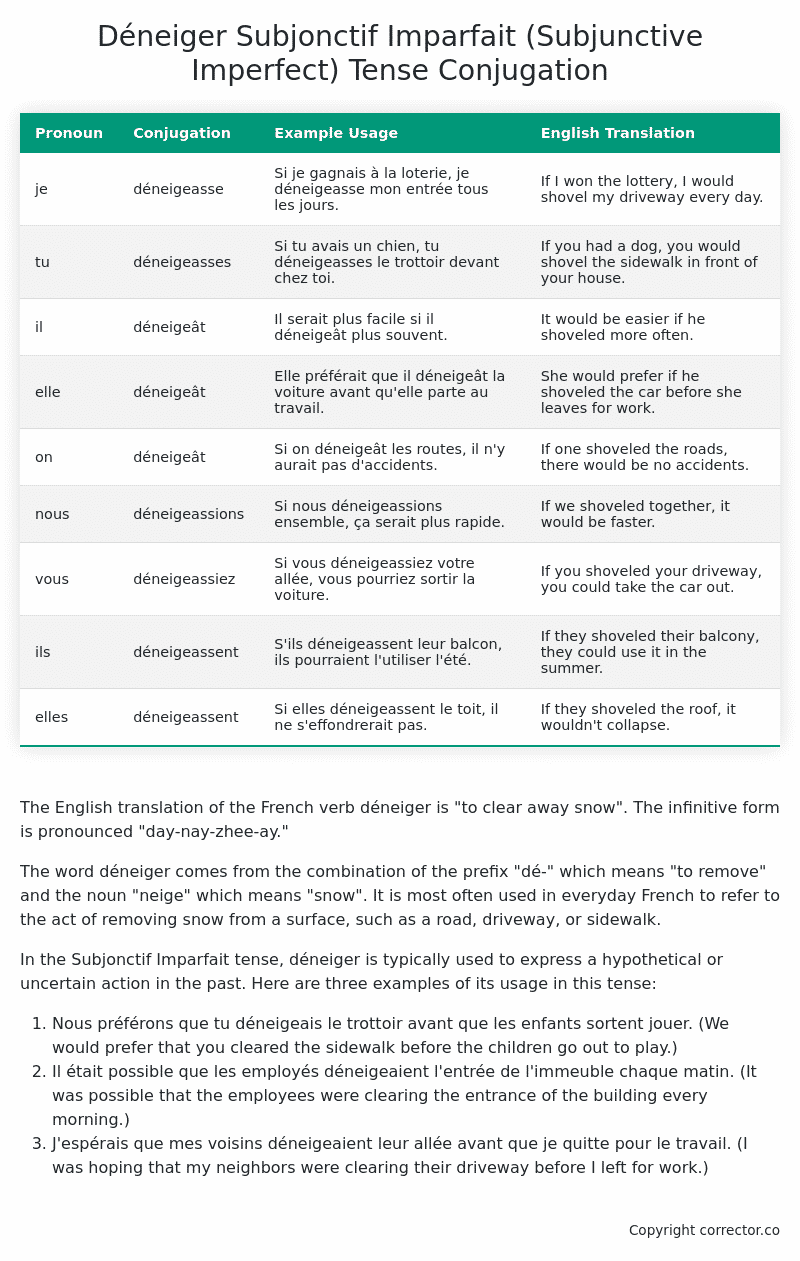Subjonctif Imparfait (Subjunctive Imperfect) Tense Conjugation of the French Verb déneiger
Introduction to the verb déneiger
The English translation of the French verb déneiger is “to clear away snow”. The infinitive form is pronounced “day-nay-zhee-ay.”
The word déneiger comes from the combination of the prefix “dé-” which means “to remove” and the noun “neige” which means “snow”. It is most often used in everyday French to refer to the act of removing snow from a surface, such as a road, driveway, or sidewalk.
In the Subjonctif Imparfait tense, déneiger is typically used to express a hypothetical or uncertain action in the past. Here are three examples of its usage in this tense:
- Nous préférons que tu déneigeais le trottoir avant que les enfants sortent jouer. (We would prefer that you cleared the sidewalk before the children go out to play.)
- Il était possible que les employés déneigeaient l’entrée de l’immeuble chaque matin. (It was possible that the employees were clearing the entrance of the building every morning.)
- J’espérais que mes voisins déneigeaient leur allée avant que je quitte pour le travail. (I was hoping that my neighbors were clearing their driveway before I left for work.)
Table of the Subjonctif Imparfait (Subjunctive Imperfect) Tense Conjugation of déneiger
| Pronoun | Conjugation | Example Usage | English Translation |
|---|---|---|---|
| je | déneigeasse | Si je gagnais à la loterie, je déneigeasse mon entrée tous les jours. | If I won the lottery, I would shovel my driveway every day. |
| tu | déneigeasses | Si tu avais un chien, tu déneigeasses le trottoir devant chez toi. | If you had a dog, you would shovel the sidewalk in front of your house. |
| il | déneigeât | Il serait plus facile si il déneigeât plus souvent. | It would be easier if he shoveled more often. |
| elle | déneigeât | Elle préférait que il déneigeât la voiture avant qu’elle parte au travail. | She would prefer if he shoveled the car before she leaves for work. |
| on | déneigeât | Si on déneigeât les routes, il n’y aurait pas d’accidents. | If one shoveled the roads, there would be no accidents. |
| nous | déneigeassions | Si nous déneigeassions ensemble, ça serait plus rapide. | If we shoveled together, it would be faster. |
| vous | déneigeassiez | Si vous déneigeassiez votre allée, vous pourriez sortir la voiture. | If you shoveled your driveway, you could take the car out. |
| ils | déneigeassent | S’ils déneigeassent leur balcon, ils pourraient l’utiliser l’été. | If they shoveled their balcony, they could use it in the summer. |
| elles | déneigeassent | Si elles déneigeassent le toit, il ne s’effondrerait pas. | If they shoveled the roof, it wouldn’t collapse. |
Other Conjugations for Déneiger.
Le Present (Present Tense) Conjugation of the French Verb déneiger
Imparfait (Imperfect) Tense Conjugation of the French Verb déneiger
Passé Simple (Simple Past) Tense Conjugation of the French Verb déneiger
Passé Composé (Present Perfect) Tense Conjugation of the French Verb déneiger
Futur Simple (Simple Future) Tense Conjugation of the French Verb déneiger
Futur Proche (Near Future) Tense Conjugation of the French Verb déneiger
Plus-que-parfait (Pluperfect) Tense Conjugation of the French Verb déneiger
Passé Antérieur (Past Anterior) Tense Conjugation of the French Verb déneiger
Futur Antérieur (Future Anterior) Tense Conjugation of the French Verb déneiger
Subjonctif Présent (Subjunctive Present) Tense Conjugation of the French Verb déneiger
Subjonctif Passé (Subjunctive Past) Tense Conjugation of the French Verb déneiger
Subjonctif Imparfait (Subjunctive Imperfect) Tense Conjugation of the French Verb déneiger (this article)
Subjonctif Plus-que-parfait (Subjunctive Pluperfect) Tense Conjugation of the French Verb déneiger
Conditionnel Présent (Conditional Present) Tense Conjugation of the French Verb déneiger
Conditionnel Passé (Conditional Past) Tense Conjugation of the French Verb déneiger
L’impératif Présent (Imperative Present) Tense Conjugation of the French Verb déneiger
L’infinitif Présent (Infinitive Present) Tense Conjugation of the French Verb déneiger
Struggling with French verbs or the language in general? Why not use our free French Grammar Checker – no registration required!
Get a FREE Download Study Sheet of this Conjugation 🔥
Simply right click the image below, click “save image” and get your free reference for the déneiger Subjonctif Imparfait tense conjugation!

Déneiger – About the French Subjonctif Imparfait (Subjunctive Imperfect) Tense
Formation
Common Everyday Usage Patterns
Interactions with Other Tenses
Subjonctif Présent
Indicatif Passé Composé
Conditional
Conditional Perfect
Summary
I hope you enjoyed this article on the verb déneiger. Still in a learning mood? Check out another TOTALLY random French verb conjugation!


